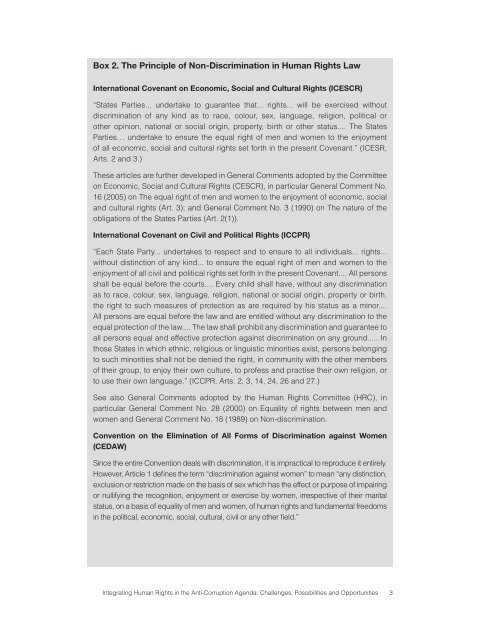Integrating Human Rights in the Anti-Corruption Agenda - The ICHRP
Integrating Human Rights in the Anti-Corruption Agenda - The ICHRP
Integrating Human Rights in the Anti-Corruption Agenda - The ICHRP
Create successful ePaper yourself
Turn your PDF publications into a flip-book with our unique Google optimized e-Paper software.
Box 2. <strong>The</strong> Pr<strong>in</strong>ciple of Non-Discrim<strong>in</strong>ation <strong>in</strong> <strong>Human</strong> <strong>Rights</strong> Law<br />
International Covenant on Economic, Social and Cultural <strong>Rights</strong> (ICESCR)<br />
“States Parties... undertake to guarantee that... rights... will be exercised without<br />
discrim<strong>in</strong>ation of any k<strong>in</strong>d as to race, colour, sex, language, religion, political or<br />
o<strong>the</strong>r op<strong>in</strong>ion, national or social orig<strong>in</strong>, property, birth or o<strong>the</strong>r status.... <strong>The</strong> States<br />
Parties… undertake to ensure <strong>the</strong> equal right of men and women to <strong>the</strong> enjoyment<br />
of all economic, social and cultural rights set forth <strong>in</strong> <strong>the</strong> present Covenant.” (ICESR,<br />
Arts. 2 and 3.)<br />
<strong>The</strong>se articles are fur<strong>the</strong>r developed <strong>in</strong> General Comments adopted by <strong>the</strong> Committee<br />
on Economic, Social and Cultural <strong>Rights</strong> (CESCR), <strong>in</strong> particular General Comment No.<br />
16 (2005) on <strong>The</strong> equal right of men and women to <strong>the</strong> enjoyment of economic, social<br />
and cultural rights (Art. 3); and General Comment No. 3 (1990) on <strong>The</strong> nature of <strong>the</strong><br />
obligations of <strong>the</strong> States Parties (Art. 2(1)).<br />
International Covenant on Civil and Political <strong>Rights</strong> (ICCPR)<br />
“Each State Party... undertakes to respect and to ensure to all <strong>in</strong>dividuals... rights...<br />
without dist<strong>in</strong>ction of any k<strong>in</strong>d... to ensure <strong>the</strong> equal right of men and women to <strong>the</strong><br />
enjoyment of all civil and political rights set forth <strong>in</strong> <strong>the</strong> present Covenant.... All persons<br />
shall be equal before <strong>the</strong> courts.... Every child shall have, without any discrim<strong>in</strong>ation<br />
as to race, colour, sex, language, religion, national or social orig<strong>in</strong>, property or birth,<br />
<strong>the</strong> right to such measures of protection as are required by his status as a m<strong>in</strong>or....<br />
All persons are equal before <strong>the</strong> law and are entitled without any discrim<strong>in</strong>ation to <strong>the</strong><br />
equal protection of <strong>the</strong> law.... <strong>The</strong> law shall prohibit any discrim<strong>in</strong>ation and guarantee to<br />
all persons equal and effective protection aga<strong>in</strong>st discrim<strong>in</strong>ation on any ground..... In<br />
those States <strong>in</strong> which ethnic, religious or l<strong>in</strong>guistic m<strong>in</strong>orities exist, persons belong<strong>in</strong>g<br />
to such m<strong>in</strong>orities shall not be denied <strong>the</strong> right, <strong>in</strong> community with <strong>the</strong> o<strong>the</strong>r members<br />
of <strong>the</strong>ir group, to enjoy <strong>the</strong>ir own culture, to profess and practise <strong>the</strong>ir own religion, or<br />
to use <strong>the</strong>ir own language.” (ICCPR, Arts. 2, 3, 14, 24, 26 and 27.)<br />
See also General Comments adopted by <strong>the</strong> <strong>Human</strong> <strong>Rights</strong> Committee (HRC), <strong>in</strong><br />
particular General Comment No. 28 (2000) on Equality of rights between men and<br />
women and General Comment No. 18 (1989) on Non-discrim<strong>in</strong>ation.<br />
Convention on <strong>the</strong> Elim<strong>in</strong>ation of All Forms of Discrim<strong>in</strong>ation aga<strong>in</strong>st Women<br />
(CEDAW)<br />
S<strong>in</strong>ce <strong>the</strong> entire Convention deals with discrim<strong>in</strong>ation, it is impractical to reproduce it entirely.<br />
However, Article 1 def<strong>in</strong>es <strong>the</strong> term “discrim<strong>in</strong>ation aga<strong>in</strong>st women” to mean “any dist<strong>in</strong>ction,<br />
exclusion or restriction made on <strong>the</strong> basis of sex which has <strong>the</strong> effect or purpose of impair<strong>in</strong>g<br />
or nullify<strong>in</strong>g <strong>the</strong> recognition, enjoyment or exercise by women, irrespective of <strong>the</strong>ir marital<br />
status, on a basis of equality of men and women, of human rights and fundamental freedoms<br />
<strong>in</strong> <strong>the</strong> political, economic, social, cultural, civil or any o<strong>the</strong>r field.”<br />
<strong>Integrat<strong>in</strong>g</strong> <strong>Human</strong> <strong>Rights</strong> <strong>in</strong> <strong>the</strong> <strong>Anti</strong>-<strong>Corruption</strong> <strong>Agenda</strong>: Challenges, Possibilities and Opportunities

















